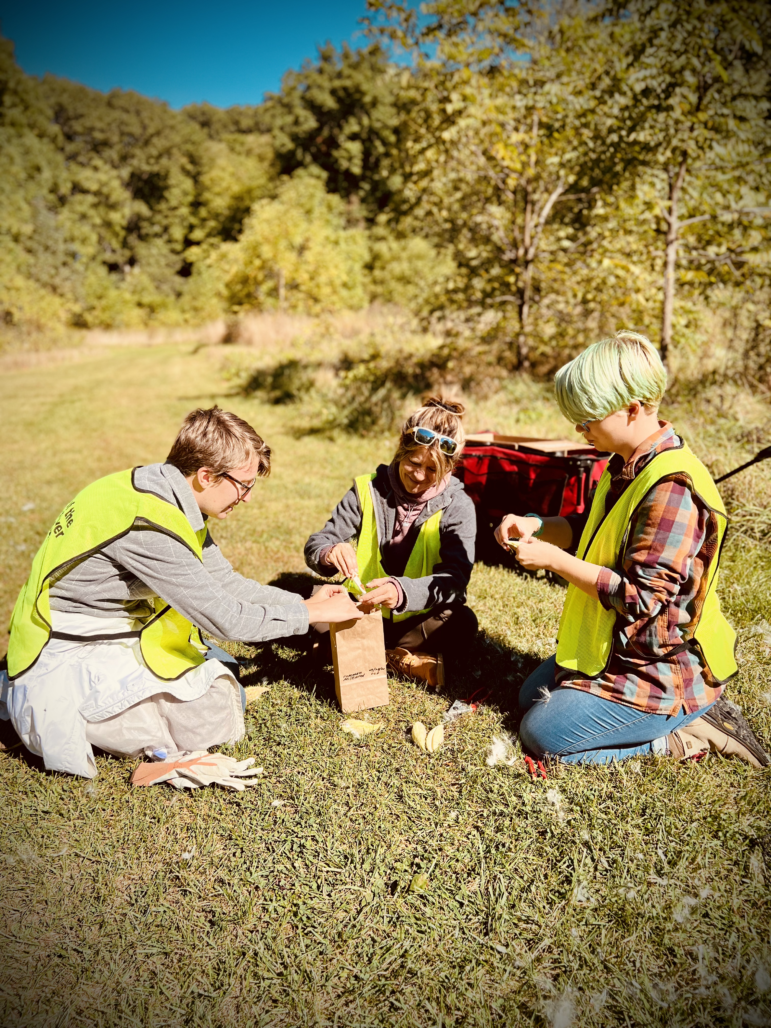
Friends of St. Clair River
Volunteers from Friends of the St. Clair River, based in St. Clair, organize seeds for a native plants project. Image: Friends of St. Clair River
By Morgan Womack
LANSING – Efforts to protect pollinators are springing up across Michigan.
The Wildflower Association of Michigan recently gave $14,769 in grants to 15 local native plant projects.
One recipient is the environmental nonprofit Friends of the St. Clair River. It received $1,250 to fund a pollinator garden and two seed libraries.
Other grant recipients include the Little Traverse Conservancy, Stewards of Glen Park in Kalamazoo, Hudsonville Christian School near Holland, Gogebic Conservation District, Grand Traverse Regional Land Conservancy, Montcalm Area Master Gardener Association and Carnegie Museum of the Keweenaw.
The garden, a 10-by-40-foot plot at the Friends of St. Clair watershed center, will have a mixture of native Michigan plants and shrubs.
Restoration coordinator Brooke Hiller, who wrote the grant proposal, said the garden will demonstrate how people can use native plants in an “aesthetically pleasing manner.”
“We’re trying to make this as accessible as possible for people to not feel intimidated by the process of putting together a pollinator garden with native plants,” Hiller said.
The seeds from the garden will be collected for two seed libraries — free resources for community members to take for their own gardens. The libraries will be at the watershed center and St. Clair County Community College.
“We’re just trying to give people a lot of options and make a low barrier to entry for people,” Hiller said. “People who might not otherwise have access or feel confident in starting seeds, I want to give them the opportunity to do it.”
Dave Putt, the Michigan Wildflower Association vice president, said funding those projects through grants is important because it increases native plant presence, which helps pollinators thrive.
Putt said invasive species and wildfires contribute to the loss of native plants.
“We lament the loss of habitat and loss of native flora,” Putt said. “We want to preserve what native flora we still have left and, through these grant awards, provide funding so we can increase the habitat of our native flora.”
Another Wildflower Association partner, Michigan Wildflower Farm, also strives to bring native plants to lawns.
Esther Durnwald has owned the farm in Portage near Kalamazoo for 27 years. She said demand for native seed has “exploded” in the past decade.
Along with native seed sales, Durnwald said the farm works with customers to determine what species will succeed on their site based on soil type, sun and moisture conditions. She often gets inquiries about which plants help pollinators and other wildlife.
“As this industry is growing, and the interest and awareness is growing, we want everyone to be as successful as possible,” Durnwald said.
Some people call Durnwald’s farm just because they want to learn how to attract monarch butterflies.
“People are really making a connection that their landscape can be pretty, but it doesn’t have to just be pleasing to the human eye,” Durnwald said. “It can also contribute so much value to other parts of life that we want to encourage.”
Morgan Womack reports for Capital News Service
